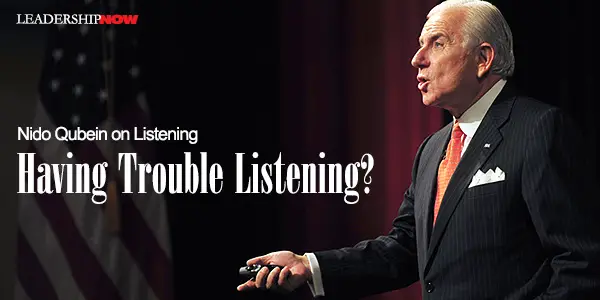 |
 |
07.12.07

Having Trouble Listening?
EFFECTIVE leaders will make a concerted effort to listen to and learn from those around them. In How to be a Great Communicator, author Nido Qubein, suggests that if you are having trouble listening, the following factors may be behind the problem: Prejudice: We all have biases. It’s all too easy to ignore a person because of something we don’t like or value about them. “It’s best to overcome our prejudices, but while we’re overcoming them we must learn to override them.” Jumping to Conclusions: Listening can be difficult, especially when you think you have heard it before. When you get that bored feeling and begin to drift away, bring yourself back to the present and “accept the challenge of drawing from the speaker some ideas and information that will be of value to you personally." Assumption: Related to the above, Qubein writes, “You may assume that you already know what the speaker is going to say, so your attention drifts elsewhere….Make it a game to look for something new to take away from the conversation.” Inattention: We can think almost four times faster than we can speak. In the lapse between the two it’s easy to place your attention elsewhere or begin to formulate what you want to say. In doing so you may miss important information. “The remedy is to use the ‘spare’ time to evaluate and interpret what the speaker is saying.” Selective Listening: Our minds are tuned to hear what we want to hear; those things that confirm what we already think. “Once again, the solution is to evaluate and interpret. Look for information and ideas that challenge your own ideas.” Excessive Talking: If we’re talking, we’re not listening. It’s easy to use someone else’s comment as a jumping-off point to your monologue. “Be conscious of the amount of time you spend talking, and be alert for signs that your listener has something to say. Be willing to yield the floor at reasonable intervals.” Lack of Empathy: Try to listen from the other person’s point of view. Knowing where the other person is coming from can give you a lot of insight into what they are saying. Fear: When you don’t like what someone else is saying or if you think it might make you look bad, instead of listening, we often begin to formulate an argument or begin to plan our escape. Force yourself to hear the other person out. Qubein cites Patrick Henry, “…Whatever anguish of spirit it may cost, I am willing to know the whole truth; to know the worst, and to provide for it.” 
Posted by Michael McKinney at 10:03 AM
|
BUILD YOUR KNOWLEDGE
 

How to Do Your Start-Up Right STRAIGHT TALK FOR START-UPS 
Grow Your Leadership Skills NEW AND UPCOMING LEADERSHIP BOOKS 
Leadership Minute BITE-SIZE CONCEPTS YOU CAN CHEW ON 
Classic Leadership Books BOOKS TO READ BEFORE YOU LEAD |